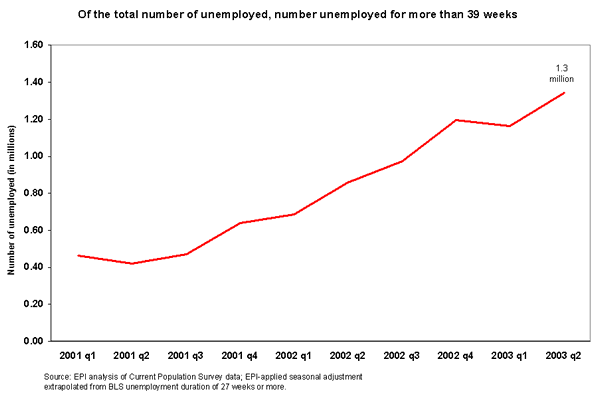Snapshot for October 15, 2003.
Long-term unemployment reveals need for another extension of unemployment insurance benefits
Published data on unemployment spells report the number of job seekers who have sought work for at least 27 weeks. Since regular state unemployment benefits generally are paid for a maximum of 26 weeks, these data, provided by the Bureau of Labor Statistics (BLS), are usually a useful measure of the extent of the hardship caused by persistent joblessness.
However, in March 2002, Congress enacted Temporary Extended Unemployment Compensation (TEUC), a program of supplemental federal benefits for the long-term unemployed, which pays a maximum of 13 weeks of additional unemployment compensation to most workers and a maximum of 26 weeks of additional compensation in a handful of states with extremely high unemployment. Therefore, a better measure of economic distress among long-term job seekers is the number who have been unemployed for more than 39 weeks.

Although these values are not published by BLS, they have been derived (and seasonally adjusted) by EPI. The figure shows that the number of long-term unemployed by this measure—unemployed for at least 40 weeks—has almost doubled since March 2002, when Congress enacted the TEUC, from just under 700,000 to 1.3 million. If the unemployed needed income support back in March of last year, they surely need it now, as the persistent lack of job creation has extended jobless spells to historic highs.
Some lawmakers have proposed that UI benefits be provided for persons unemployed beyond the 39 weeks now available in most states. The number of job seekers who have been unemployed for more than 39 weeks shows how many people would benefit from this proposal.
This week’s Snapshot was written by EPI Vice President Ross Eisenbrey and EPI economist Sylvia Allegretto.
Check out the archive for past Economic Snapshots.
